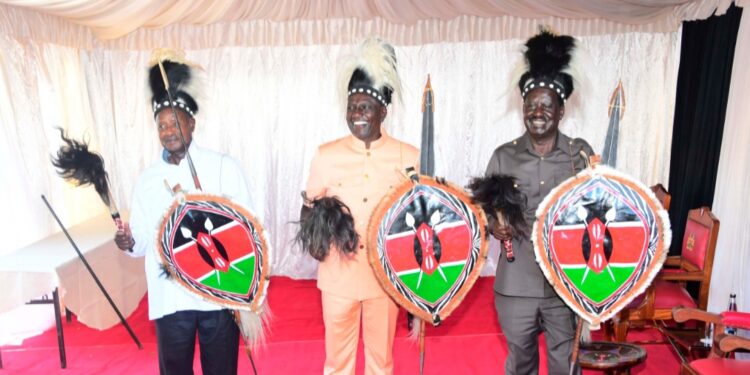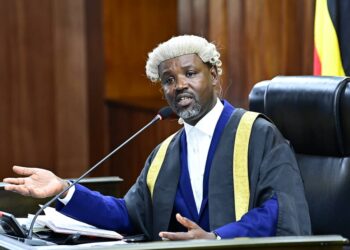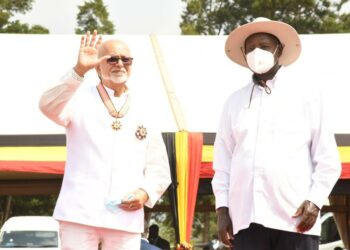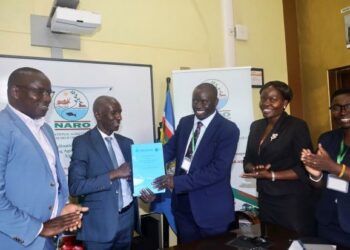President Yoweri Kaguta Museveni’s Thursday coronation as a Luo elder at the Piny Luo Festival in Siaya County, in neighbouring Kenya, has sparked excitement and curiosity among people in the Lango sub-region
This honor, bestowed upon him by the Ker (cultural leader) or King of Luo, His Royal Highness Odungi Randa, marks the fourth time Museveni has been recognized by the Luo community, including the Alur, Acholi, and Lango in Uganda.
The ceremony, which took place at the Got Ramogi Hill shrines, was attended by Kenya’s President William Kipchirchir Samoei Arap Ruto and former Kenyan Prime Minister Raila Amolo Odinga, who were also crowned as Luo elders.
The event highlights the rich cultural heritage of the Luo people and promotes unity and reconciliation among the various Luo communities across the region.
The Ugandan president’s coronation has also sparked interesting discussions, particularly in light of recent accusations made by a minority group against Eng. Dr. Michael Moses Odongo Okune, the new Paramount Chief of the Lango Cultural Institution, also known as Tekwaro Lango.
The group had claimed that Dr Odongo Okune’s ties with Raila Amolo Odinga, a perceived arch-nemesis of Uganda’s Museveni, would undermine the NRM party and Museveni’s re-election campaign in the sub-region of about 2.8 million people.
However, President Museveni’s presence at the Piny Luo festival, alongside Raila Amolo Odinga and President William Ruto, is now being seen as an important and strategic gesture of unity and cooperation.
Additionally, the Luo ceremony has also brought back memories of a frustrated coronation ceremony that was supposed to take place in Lira City.
As one cultural leader Awitong Simon Peter Odoo noted, the event has not only exonerated Dr Odongo Okune and the cultural leaders on his side, but also exposed the accusations as baseless and driven by fear of embracing new leadership.
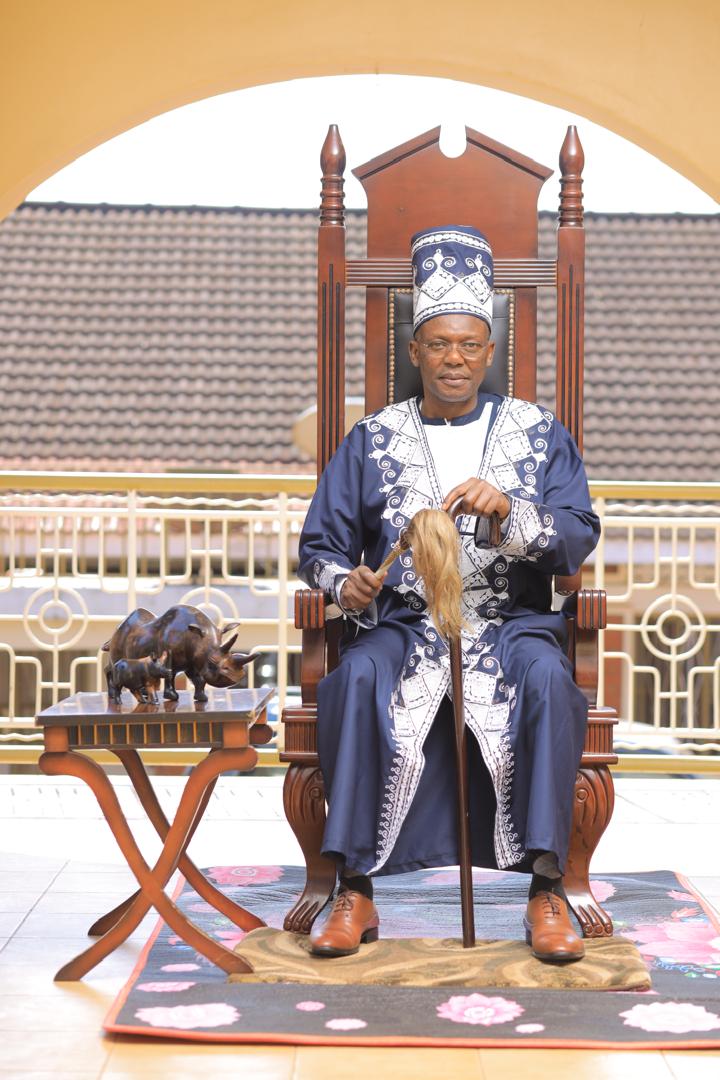
As can be recalled, King Odungi Randa had already arrived in Lira City ahead of the highly-billed ceremony, which was meant to install Eng Dr. Michael Odongo Okune as the new Paramount Chief of the Lango Cultural Institution.
The landmark ceremony, which was supposed to be the first of its kind since the Lango people migrated from Abyssinia (Ethiopia) in the 16th century, was highly anticipated by the community.
Many people had bought new garments (gomes and suits and cultural regalia, insignia) and were eagerly looking forward to the event.
Unfortunately, the ceremony was cancelled, leaving many heartbroken and disappointed.
The wounds of that disappointment still linger today in the memory of many.
The cancellation of the coronation ceremony for Eng. Dr. Michael Odongo Okune as the new Paramount Chief of the Lango Cultural Institution was a big disappointment, especially considering the excitement and anticipation surrounding the event.
Over 50 international guests from countries like the USA, UK, Kenya, South Sudan, Ethiopia, Eretria, Ghana, Nigeria (West Africa), Egypt, and South Africa, among others, had already arrived in the country, eager to witness this historic moment for the Lango people.
As if to add salt to the injury, the Lango Community which are spread in the districts of Apac, Alebtong, Amolatar, Dokolo, Oyam, Otuke, Kole, Kwania, Lira and Lira City is now also grappling with painful challenges, including fragmentation along religious, political and cultural lines.
This division has led to a lack of unity among leaders, making it difficult for the community to come together and work towards common goals.
Commentators believe it may take decades for the Lango people to find a unifying figure.
In contrast, neighboring communities like the Kumam, Acholi, Teso, Busoga, and Karamoja are making strides in development, commissioning and lobbying for projects that benefit their regions.
Meanwhile, the Lango community is often criticized for being overly focused on trading insults and accusations on social media and local radio stations.
This infighting has led some to describe the Lango people as “a joke” and “unserious,” with a tendency to celebrate the downfall of their leaders rather than working together towards progress.
In contrast, the Piny Luo festival in Kenya was a resounding success, promoting unity and reconciliation among the various Luo communities across the region.
During the ceremony, Museveni who was able to use some Luo words, expressed his gratitude to the Luo community and emphasized the importance of unity and cooperation among East African Community (EAC) member states.
He also highlighted the need for economic integration and the creation of wealth through sectors such as commercial agriculture, ICT, services, and manufacturing.
The Piny Luo festival, which took place from December 31st, 2024, to January 2nd, 2025, featured a range of activities, including traditional dances, foods, and attire.
The event was attended by various groups of Luo luminaries from across Africa, including Uganda, Tanzania, Ethiopia, and the Democratic Republic of the Congo.
In conclusion, President Yoweri Museveni’s coronation as a Luo elder has been a significant event, promoting unity and cooperation among the Luo community and East African Community (EAC)member states.
The event has also highlighted the importance of cultural heritage and economic integration in achieving prosperity and development in the region.
The success of the Luo Festival, which drew crowds from across the region, has also been seen as a testament to the growing importance of cultural heritage in East Africa.
Coming on the heels of the highly successful Ateker Festival, organized by the Iteso Cultural leadership under Emorimor, HRH Papa Paul Sande Etomeileng Emolot, the Luo Festival has underscored the rich cultural diversity of the region.
The Ateker Festival (under the theme: “Celebrating Shared Heritage, Forging A Path Towards Peace, Prosperity and Cultural Renaissance”), which took place just a few weeks prior, was a resounding success, attracting Ateker people from as far afield as Ethiopia and beyond.
The festival served as a powerful reminder of the shared history and cultural traditions that bind the Ateker people together.
Similarly, the Luo Festival has provided a platform for the Luo community to come together and celebrate their rich cultural heritage.
With its vibrant music, dance, and traditional attire, the festival was a joyous celebration of Luo culture and identity.
The success of these festivals has also highlighted the importance of cultural tourism in promoting economic development and cultural exchange in the region.
As East Africa continues to grow and develop, it is clear that cultural heritage will play an increasingly important role in shaping the region’s identity and promoting its rich cultural diversity.
Back home, the question of unity in Lango is a delicate issue, and it’s likely to become even more challenging as Uganda gears up for the general elections.
With current leaders like MPs and LC5 chairpersons and mayors fighting to retain their positions and new entrants eager to take over, the political landscape is expected to become increasingly fragmented and charged.
Despite these challenges, there are efforts underway to promote unity and reconciliation in Lango.
Leaders in the region have called for peace and unity, emphasizing the importance of putting aside differences and working towards a common goal.
Alternative Dispute Resolution (ADR)practitioners and peacebuilding professionals have floated numerous suggestions as a way forward to ending the painful conflicts.
They are asking stakeholders in the centre of the conflict to embrace dialogue and reconciliation to build unity and trust.
They suggest that leaders in the sub region must work to be more inclusive and representative of the diverse interests and groups within the community and that they should celebrate and promote the rich cultural heritage of Lango that can foster a sense of belonging, identity and unity.
Do you have a story in your community or an opinion to share with us: Email us at editorial@watchdoguganda.com


